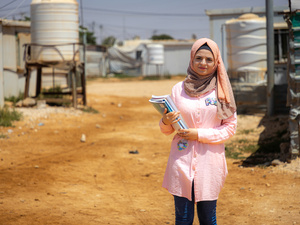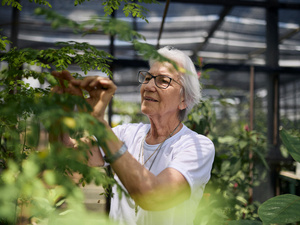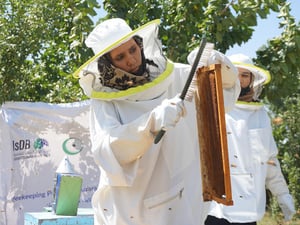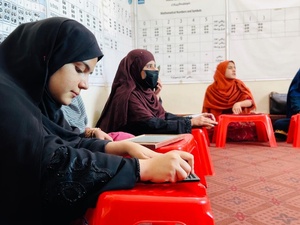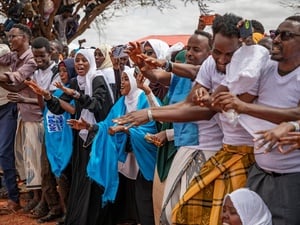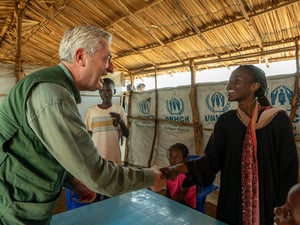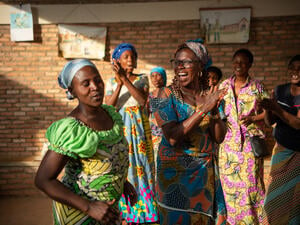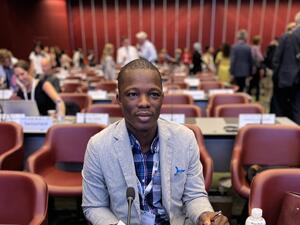International Women's Day: UNHCR and Nike encourage Somali refugee girls to play sports
International Women's Day: UNHCR and Nike encourage Somali refugee girls to play sports
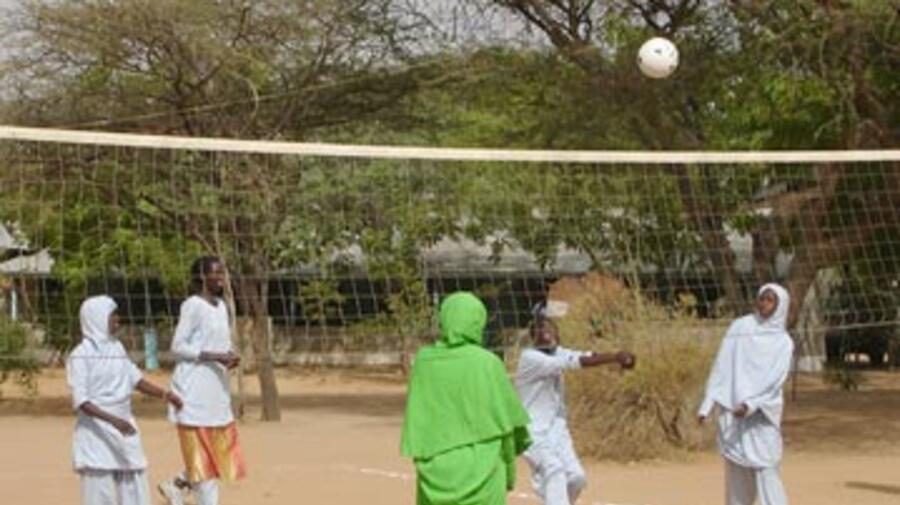
Action from a volleyball match between girls from two camps in Dadaab, north-east Kenya.
DADAAB, Kenya, March 8 (UNHCR) - It has been a hard struggle, but UNHCR and its corporate partner Nike have had some success over the past three years in encouraging Somali girls to engage in sports at three refugee camps here in north-east Kenya.
When the partners launched their "Together for Girls" campaign in July 2004, less than 100 girls played sport compared to more than 5,000 boys in Dadaab, a three-camp complex hosting some 170,000 refugees.
None of the girls were from the mainly Muslim Somali community, which makes up 98 per cent of Dadaab's refugee population. But today, more than 270 Somali refugee girls regularly play sports on the dusty camp facilities - most play volleyball, but some also enjoy badminton, handball, netball and football.
And some of them will be taking part in a special volleyball tournament being held today in Dadaab's Dagahaley camp to mark International Women's Day. Aid workers will take on a team of refugees drawn from Dagahaley and Ifo camps.
"This pilot initiative has gone a long way in really helping girls to come out of their houses and say, 'Look, we can also play sports,'" said Nemia Temporal, the head of UNHCR's office in Dadaab. The campaign also tallies with one of the core aims of the joint UNHCR-Nike-Microsoft ninemillion.org campaign - to get young female refugees more involved in sports.
Organisers of the initiative and sports coordinators in the camps have always faced a major obstacle in getting results - the Somali refugee community is still not sure if girls should play sports. Some conservative Muslims link sports with loose morals, while boys in the camp have on occasion thrown stones at Somali girls returning home from sports activities.
Elizabeth Mwiyeria is sports coordinator of the project and works for UNHCR's implementing partner, CARE. She said the main opposition comes from parents and religious leaders. "They say girls should not play in public and people should not watch them when they are playing. Some say that when they [girls] play, they get strong and I think the men don't like that," Mwiyeria added.
But some hardened opponents have become fans of the initiative, such as Arfon Hussein, who took in Zahra Hussein Aden after the girl's parents were killed in Somalia's long civil war. Two years ago, Afron threatened to kick the girl out of their camp home after she came back late from her first volleyball practice.
"I did not say anything. That night, I just slept with no food. I prayed to God," said the 17-year-old. But after she explained that she had been invited by CARE and that there were only girls, her stepmother became positively enthusiastic and Zahra has since become the captain of the volleyball team for Somali refugee girls in Dagahaley camp.
She encouraged others to come and play and said that it not only kept her fit and healthy, but was also therapeutic in the monotonous routine of camp life. "When I joined the team in Dagahaley two years ago, we were only two Somali girls playing sports. Now there are 87 girls in different teams," Zahra said.
A former teammate, Ismahan, has not been as lucky. Her parents were initially happy for her to join the volleyball team, but later changed their minds and said she must concentrate on school and household chores.
"Some of the parents do not allow the girls to play. We have had to go from family to family to convince them that what the girls are doing is not unusual. Sport is played all over the world," said Abshiro Aden Mohammed, a member of the female sports committee in Dagahaley.
"Change is gradual and we will eventually come up with an educated community on sports," she predicted, while noting that many opponents had changed their minds after the benefits were explained to them. But Abshiro and her colleagues will still need to convince people like Sheikh Mohammed Noor Abdi Hussein.
"I as an individual would not encourage my daughter to play sports, but it is a matter for the community. I cannot impose my views, I can only give guidance," said the sheik, who wields influence in Dadaab's Ifo camp as a kadi or Islamic judge. The sheik advised that if girls must play outdoor games, they should wear appropriate clothing, play in secluded fields and have no interaction with boys.
UNHCR and CARE have made efforts to meet these requirements. The girls have been given special sports clothing designed with the help of Nike. This includes a hijab to cover the hair, a long-sleeved tunic and loose, ankle-length trousers. Playing fields have been fenced off and "girls only" signs will be put up.
The "Together for Girls" project, which has also received funding from the Japan Association for UNHCR, plans to include physical education in the curricula of Dadaab's camp schools. That could help win broader acceptance among the Somali refugee community for the idea of sports for girls.
By Millicent Mutuli in Dadaab, Kenya

